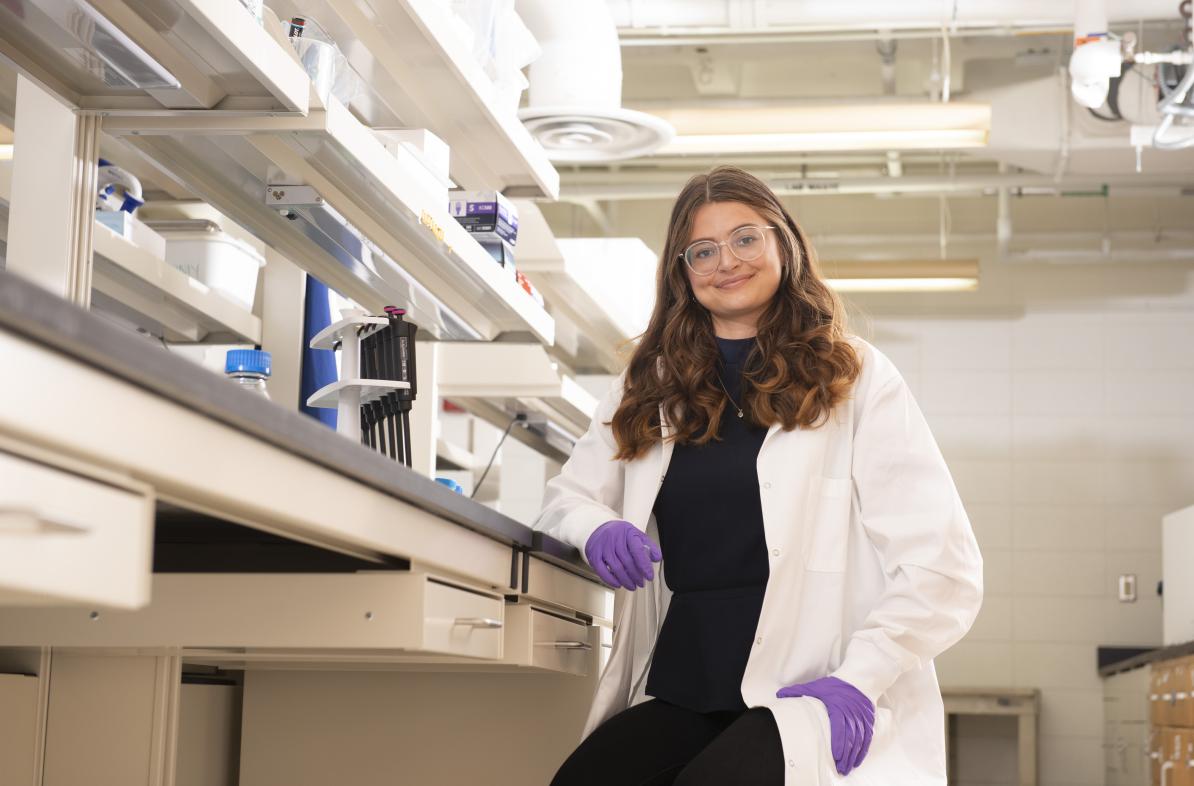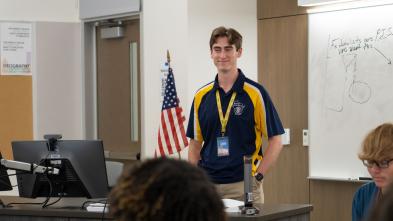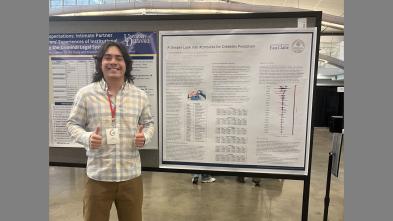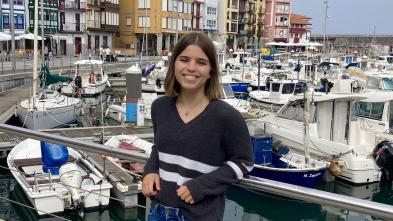
Blugold finds a new path thanks to undergraduate research, mentors
Carley Owens came to the University of Wisconsin-Eau Claire thinking it was a step toward medical school and then to her future career as a physician.
However, a series of opportunities and experiences — along with personal tragedies and challenges — during her undergraduate years took her down a slightly different path, one that she now knows is leading her to a future career that is an even better fit for her.
When Owens graduates this month, she will have a degree in neuroscience along with a resume filled with impressive research experiences and successes both on and off campus. Her future plans now include earning a Ph.D. in neuroscience and contributing to the medical field as a scientist.
“My undergraduate research experiences at UWEC have helped me develop my identity as a scientist, and I eventually settled on a new major in neuroscience to combine my love for psychology, biology and medicine,” says Owens, a native of Barneveld.
Discovering a passion for research
Five years ago, as a new college freshman, Owens never expected to be doing research, she says. She was intrigued, however, by the many psychology-related labs on UW-Eau Claire’s campus.
“I immediately asked my Psychology 100 professor how to get involved,” Owens says of her introduction to undergraduate research. “My ambition led me to begin collaborating with psychology professor Dr. Jennifer Muehlenkamp and soon after I was pursuing answers to my own research questions within the Suicide Prevention and Research Collaboration (SPARC) program.”
Her work in the SPARC lab was “personally rewarding” and became the “building blocks” of her undergraduate research career, Owens says, adding that Muehlenkamp has been a tremendous mentor throughout her time on campus.
Describing Owens as “a tenacious, resilient, intelligent and highly motivated student,” Muehlenkamp welcomed her into her research lab and included her in numerous projects. In every lab and on every project, Owens has exceeded expectations, Muehlenkamp says.
“Along with taking a number of highly challenging courses and being an excellent student, Carley has been able to blend her interests in biology and psychology — working on important research in both disciplines — and eventually settling on a neuroscience major,” Muehlenkamp says.
As an undergraduate, Owens presented research findings at national conferences, including the 52nd Annual Conference of the American Association of Suicidology in Florida. She also presented research at the Mayo Clinic choice awards in 2019, an opportunity she was offered because her research was “identified as having significant implications in the in-patient community,” she says.
Soon research “became the focus of my career planning and only intensified my craving for more knowledge,” Owens says.
Overcoming challenges, embracing opportunities
While she has had many successes as a Blugold, Owens also had to overcome personal hardships during her time at UW-Eau Claire.
For example, shortly after joining the SPARC team, Owens lost one of her friends to suicide, a devastating experience that left her shaken, though also even more committed to her SPARC research.
“This work with SPARC fulfilled me until I lost one of my best friends to suicide, and with him, my rose-colored glasses of life,” Owens says of the tragedy.
Following her friend’s suicide, Owens says she was “directionless” as she contemplated her future. After taking time to reflect on what matters most to her, she realized that the best way she can contribute to the health care field is through research.
“I have a need to help others,” Owens says. “I am most driven to help those who society disregards, shames and blames. How could I be helpful to them? Cognizant that improving medicinal practices are direct implications of scientific research, I decided the most effective way to improve medicinal systems and overall quality of care would be to join in that process.”
With a new goal to be a scientist, Owens sought out even more research opportunities.
Her curiosity about the molecular mechanisms involved in behavioral aspects of disorders in psychology grew significantly and brought her to yet another faculty mentor, Dr. Brad Carter, an assistant professor of biology.
“To expand my knowledge and skills of the brain at the cellular scale, I joined Dr. Carter’s lab in spring 2020 to work on and eventually lead a new and groundbreaking project assessing toxicology of environmental chemicals associated with Autism Spectrum Disorder,” Owens says. “I’ve presented these findings at a couple larger-scale conferences as well.”
Owens was awarded a prestigious summer Mayo Clinic Health System practicum, has presented her research on campus and at national conferences linked to specialty professions, and co-authored a book chapter with Muehlenkamp that is in press.
Faculty mentors
Owens says Muehlenkamp has been a valuable mentor throughout her college career, someone who has encouraged and guided her through the challenges and successes.
“We’ve shared so many hardships, stories, memories; we’ve even traveled across the country together,” Owens says of Muehlenkamp. “She has had a profound impact on both my experience here as a student, as well as me as a person and how I go about caring for others.”
By working alongside Muehlenkamp, Owens also developed technical skills in Institutional Review Board training, data management, running participants and performing risk assessments as a mandatory reporter.
“I am grateful to have earned such a place in my lab and at the university,” Owens says. “Traveling to conferences and co-authoring a chapter were opportunities that caused some imposter syndrome, but nonetheless shaped the future of my life.”
Her research experiences as a Blugold are “great foundational steps” that many young scientists may be intimidated by, Owens says. Fortunately, she says, she had her mentors to support her as she took those steps.
“I had the opportunity to complete such feats with amazing mentors, great support from my family and the countless friends I've made here at UWEC,” Owens says.
She credits Muehlenkamp and Carter with providing her opportunities and experiences that helped prepare her for a Summer Undergraduate Research Fellowship (SURF) program at Mayo Clinic in Rochester, Minnesota.
Calling the program an “amazing experience,” Owens says it was a thrill to work with accomplished scientists in the department of neurologic surgery. In that program, she was primarily working on mapping out the pathway of activation following stimulation of the Vagas nerve in rats.
“While on the Rochester campus, I shadowed human neurosurgery, sliced brains, networked with postgraduates and postdocs, attended countless seminars and absorbed life stories about successful scientists whose footsteps I aspire to follow,” Owens says. “I felt an overwhelming belonging during my short time immersed in this intense scientific community of biomedical researchers.”
A bright future
While she’s eager to go to graduate school to earn her doctorate in neuroscience, she wants to take more time to decide on a specific path that is best for her.
“Now is the time to explore all possibilities,” Owens says. “I have gained clinical inspiration for research as an in-home caretaker for individuals with a variety of special needs, including intellectual disabilities, schizoaffective disorder and personality disorders. Post-graduation, I am in search of a learning community dedicated to improving quality of life of those for whom society has failed to meet the needs or have deemed untreatable, such as the mentally ill, persons with developmental disabilities and traumatic brain injury.”
In the future, she hopes to focus her work on “preventative medicine and understanding illness rather than 'Band-Aid' treatment of pharmacological interventions targeting symptomology,” Owens says.
Muehlenkamp is confident Owens will excel wherever her career takes her.
“She is compassionate, funny, engaging and all-around amazing,” Muehlenkamp says of Owens.
You may also like


